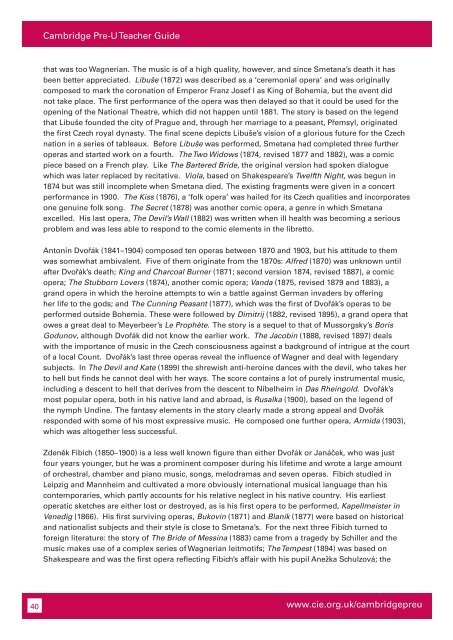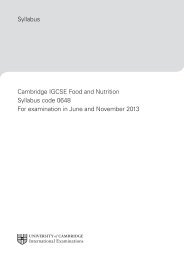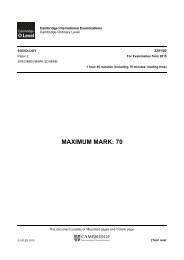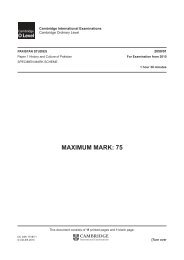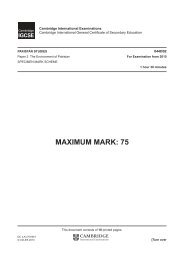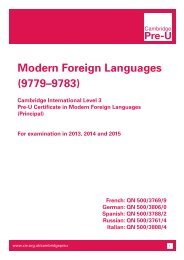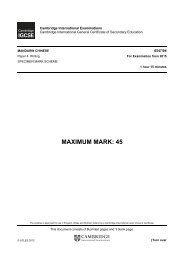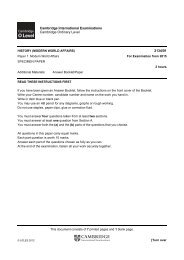Teacher's Guide Cambridge Pre-U MUSIC Available for teaching ...
Teacher's Guide Cambridge Pre-U MUSIC Available for teaching ...
Teacher's Guide Cambridge Pre-U MUSIC Available for teaching ...
Create successful ePaper yourself
Turn your PDF publications into a flip-book with our unique Google optimized e-Paper software.
40<br />
<strong>Cambridge</strong> <strong>Pre</strong>-U Teacher <strong>Guide</strong><br />
that was too Wagnerian. The music is of a high quality, however, and since Smetana’s death it has<br />
been better appreciated. Libuše (1872) was described as a ‘ceremonial opera’ and was originally<br />
composed to mark the coronation of Emperor Franz Josef I as King of Bohemia, but the event did<br />
not take place. The first per<strong>for</strong>mance of the opera was then delayed so that it could be used <strong>for</strong> the<br />
opening of the National Theatre, which did not happen until 1881. The story is based on the legend<br />
that Libuše founded the city of Prague and, through her marriage to a peasant, Pemsyl, originated<br />
the first Czech royal dynasty. The final scene depicts Libuše’s vision of a glorious future <strong>for</strong> the Czech<br />
nation in a series of tableaux. Be<strong>for</strong>e Libuše was per<strong>for</strong>med, Smetana had completed three further<br />
operas and started work on a fourth. The Two Widows (1874, revised 1877 and 1882), was a comic<br />
piece based on a French play. Like The Bartered Bride, the original version had spoken dialogue<br />
which was later replaced by recitative. Viola, based on Shakespeare’s Twelfth Night, was begun in<br />
1874 but was still incomplete when Smetana died. The existing fragments were given in a concert<br />
per<strong>for</strong>mance in 1900. The Kiss (1876), a ‘folk opera’ was hailed <strong>for</strong> its Czech qualities and incorporates<br />
one genuine folk song. The Secret (1878) was another comic opera, a genre in which Smetana<br />
excelled. His last opera, The Devil’s Wall (1882) was written when ill health was becoming a serious<br />
problem and was less able to respond to the comic elements in the libretto.<br />
Antonín Dvoák (1841–1904) composed ten operas between 1870 and 1903, but his attitude to them<br />
was somewhat ambivalent. Five of them originate from the 1870s: Alfred (1870) was unknown until<br />
after Dvoák’s death; King and Charcoal Burner (1871; second version 1874, revised 1887), a comic<br />
opera; The Stubborn Lovers (1874), another comic opera; Vanda (1875, revised 1879 and 1883), a<br />
grand opera in which the heroine attempts to win a battle against German invaders by offering<br />
her life to the gods; and The Cunning Peasant (1877), which was the first of Dvoák’s operas to be<br />
per<strong>for</strong>med outside Bohemia. These were followed by Dimitrij (1882, revised 1895), a grand opera that<br />
owes a great deal to Meyerbeer’s Le Prophète. The story is a sequel to that of Mussorgsky’s Boris<br />
Godunov, although Dvoák did not know the earlier work. The Jacobin (1888, revised 1897) deals<br />
with the importance of music in the Czech consciousness against a background of intrigue at the court<br />
of a local Count. Dvoák’s last three operas reveal the influence of Wagner and deal with legendary<br />
subjects. In The Devil and Kate (1899) the shrewish anti-heroine dances with the devil, who takes her<br />
to hell but finds he cannot deal with her ways. The score contains a lot of purely instrumental music,<br />
including a descent to hell that derives from the descent to Nibelheim in Das Rheingold. Dvoák’s<br />
most popular opera, both in his native land and abroad, is Rusalka (1900), based on the legend of<br />
the nymph Undine. The fantasy elements in the story clearly made a strong appeal and Dvoák<br />
responded with some of his most expressive music. He composed one further opera, Armida (1903),<br />
which was altogether less successful.<br />
Zdenk Fibich (1850–1900) is a less well known figure than either Dvoák or Janáek, who was just<br />
four years younger, but he was a prominent composer during his lifetime and wrote a large amount<br />
of orchestral, chamber and piano music, songs, melodramas and seven operas. Fibich studied in<br />
Leipzig and Mannheim and cultivated a more obviously international musical language than his<br />
contemporaries, which partly accounts <strong>for</strong> his relative neglect in his native country. His earliest<br />
operatic sketches are either lost or destroyed, as is his first opera to be per<strong>for</strong>med, Kapellmeister in<br />
Venedig (1866). His first surviving operas, Bukovin (1871) and Blaník (1877) were based on historical<br />
and nationalist subjects and their style is close to Smetana’s. For the next three Fibich turned to<br />
<strong>for</strong>eign literature: the story of The Bride of Messina (1883) came from a tragedy by Schiller and the<br />
music makes use of a complex series of Wagnerian leitmotifs; The Tempest (1894) was based on<br />
Shakespeare and was the first opera reflecting Fibich’s affair with his pupil Anežka Schulzová; the<br />
www.cie.org.uk/cambridgepreu


